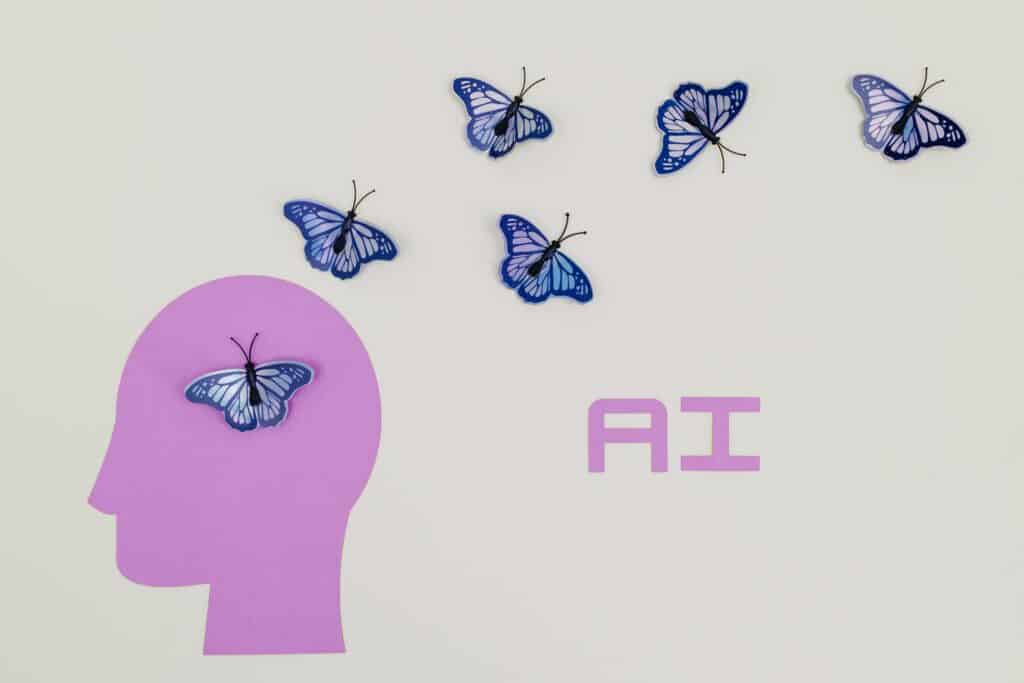Artificial Intelligence Therapy: What Is AI Therapy?
AI therapy (or artificial intelligence therapy) is a new form of cognitive therapy that uses artificial intelligence to help you learn and grow. AI therapy is based on the idea that machines can be used to help us learn and grow, just like a live in-person therapist. AI therapists use AI-powered algorithms to identify patterns in your thinking and behavior and suggest personalized interventions that help you build resilience, increase self-awareness, develop healthier relationship skills, and more. With AI therapy, you can get personalized guidance, support, and suggestions tailored to your specific needs. AI therapy is an exciting new concept that has a lot of potential to help people lead better lives but some experts express concerns as well as possible ethical considerations. In this article, I’ll explore the concept of AI therapy, who it’s suitable for, and how it can benefit you. I’ll also discuss some of the potential ethical issues that come with AI-based therapies.
What Is AI Therapy
At its core, AI therapy is a form of cognitive-behavioral therapy (CBT) but instead of having an in-person therapist guide you through the process, your therapist or coach is an artificial intelligence algorithm. AI therapists work with natural language processing technology to interpret your conversations and interpret patterns in your behavior that may be affecting your mental health.
Once the AI has analyzed your conversations, it can make recommendations to help you reach a desired outcome or goal. It might suggest coping strategies or exercises based on your specific needs and circumstances. AI therapists are also able to track your progress over time and use that data to further personalize their interventions for better outcomes.
AI therapy has the potential to make therapy more accessible and personalized for those who may not have access to traditional forms of therapy. It also allows for greater privacy and convenience, as you can access it from the comfort of your own home. In addition, AI-based therapies are typically cheaper than in-person services.

How Does AI Therapy Work
AI therapy works by using complex algorithms and natural language processing to interpret conversations, identify patterns in your thinking and behavior, and provide personalized advice and suggestions. AI therapists are able to track your progress over time, providing helpful feedback on how you’re doing as well as personalized interventions that can help you reach your goals.
Examples of AI Therapy
Woebot, an AI chatbot, is a popular example of automated therapy. Woebot offers 24/7 support for people struggling with mental health issues such as depression and anxiety. By using natural language processing algorithms, it can offer personalized advice and insights to help people manage their emotions. Woebot uses cognitive-behavioral therapy, a popular form of psychotherapy, to help people think and act in healthier ways.
Wysa is another AI chatbot designed to help people with mental health issues. It uses an AI-based algorithm called PEARL that tailors conversations based on users’ responses and goals. Wysa also provides guided meditations, personalized coping strategies, and even integration with Apple HealthKit for those who want more information about their well-being.
Ellie, a virtual therapist powered by AI, is another example of automated therapy. It uses natural language processing and machine learning algorithms to analyze conversations between patients and therapists, offering personalized advice and feedback in real time. Ellie also offers cognitive behavioral therapies such as CBT, ACT, and DBT and can provide guidance on topics such as stress, anxiety, relationships, and self-esteem.
Lumen5 is an AI-based therapy bot that offers a personalized approach to mental health care. Using natural language processing algorithms, it can analyze conversations between users and therapists and provide tailored advice on how to tackle any issues that arise. It also provides interactive activities such as yoga, meditation, and breathing exercises to help users stay relaxed and focused.
Tess is another example of AI therapy. Tess uses artificial intelligence algorithms to create personalized mental health programs for users. It provides a range of evidence-based treatments such as cognitive behavioral therapy (CBT), dialectical behavior therapy (DBT), and mindfulness-based cognitive therapy (MBCT). Tess also offers a library of educational materials to help users gain insight into their mental health issues.
Ginger.io is an AI-powered platform that aims to make mental healthcare more accessible by connecting people with therapists, coaches, and other professionals. It uses natural language processing and machine learning algorithms to detect changes in behavior or emotions that may require additional attention. This allows users to receive timely interventions and support when needed.
AI-Therapy is a digital platform that combines AI technology with evidence-based psychotherapy techniques. It offers a range of interactive exercises and activities designed to help people manage their mental health. The platform also provides tools to track progress and measure the effectiveness of different interventions over time.
AIMed, an AI-based system developed by King’s College London provides automated cognitive behavioral therapy (CBT). It uses AI to deliver evidence-based interventions tailored to the needs of each patient. AIMed can help people with depression and anxiety manage their symptoms more effectively.
Finally, IBM Watson Health has developed an AI-driven virtual coach called MoodCoach. This app helps people track their moods and provides personalized interventions to help them cope with stress and anxiety. By combining AI technology with evidence-based psychological techniques, MoodCoach can give users the support they need to improve their mental well-being.
These are just a few of the many automated therapy solutions available today. As AI continues to grow more sophisticated, so too will the range of AI-driven therapies available to help people cope with mental health issues.

What Is the Difference Between AI-Based Therapy and AI-Assisted Therapy
AI-based therapy is the use of artificial intelligence to replace more traditional therapies provided by a live qualified mental health professional. AI-based therapy typically uses a computer algorithm or machine learning model to interact with the patient. The AI system will analyze the patient’s responses and provide tailored advice or treatment. With AI-based therapy, AI algorithms are used to create and deliver personalized mental health treatments. This type of therapy can be completely automated, with no human involvement at all.
AI-assisted therapy, on the other hand, involves a combination of AI technology and traditional psychotherapy techniques. In this case, a qualified professional provides therapy alongside AI tools and algorithms to deliver personalized interventions. This type of therapy ensures that human expertise is still involved in the process while taking advantage of the latest advancements in AI technology.
Who Is AI Therapy Suitable For
AI Therapy is suitable for anyone looking to better manage their mental health. It can be especially beneficial for those who don’t have access to traditional therapy services or for people who prefer a more private and automated approach. It can also be significantly cheaper than traditional therapy with a live mental health professional. AI Therapy is also a great option for those who are looking to supplement their existing therapy sessions with additional support between visits.
AI therapy is suitable for those who are looking for an alternative to traditional, in-person cognitive behavioral therapy (CBT) or want the convenience and privacy of being able to access a therapist from home. AI therapy may also be beneficial for those who have difficulty attending regular appointments due to scheduling conflicts, distance, or mental health issues like social anxiety.
What Are the Benefits of AI Therapy
The benefits of AI therapy include greater accessibility, convenience, and privacy. AI therapists can also provide personalized interventions based on your specific needs and circumstances. In addition, AI-based therapies generally cost significantly less than traditional in-person services, making them more financially accessible. Cost is often the main reason people don’t seek therapy, holding them back from potentially life-changing help.
What Are the Disadvantages of AI Therapy
There are a few potential disadvantages of AI therapy. Because the algorithms used to interpret conversations and suggest interventions are still being developed, they may not be as accurate as traditional forms of therapy. Additionally, AI therapies lack human interaction, which can be an important part of the therapeutic process for some people. Finally, there may be ethical concerns about using AI-based therapies, as some people may feel uncomfortable with the idea of an algorithm “reading” their thoughts or conversations.

What Are the Concerns Regarding AI Therapy
One of the primary concerns about AI therapy is privacy. While AI-based therapies are generally more private than traditional in-person sessions, there’s still a risk that your conversations could be accessed and used by third parties. Additionally, algorithms used to interpret conversations may not always be accurate or sensitive to individual needs, which some argue can lead to ineffective or even harmful interventions.
Ethical Issues Related to AI Therapy
AI therapy has the potential to revolutionize mental health care but it also raises important ethical questions. For example, if an AI therapist is providing personalized advice based on a person’s circumstances and conversations, who is responsible for that advice and is it ethically sound? Additionally, does an AI-based system have the capacity to understand complex emotions and nuances in conversations, or is it merely providing a series of predetermined responses?
There is also the potential for bias in AI algorithms, as well as privacy concerns about how your data is being used and stored. Additionally, some experts believe that AI therapists may be too impersonal and not provide enough empathy or understanding of a person’s individual situation. It’s important to understand the potential risks and ethical considerations of AI therapy before engaging in it.
Conclusion
AI therapy has the potential to revolutionize mental health care and provide more affordable, convenient options for those seeking help. However, it’s important to understand the potential risks and ethical considerations involved before engaging in AI therapy. Additionally, AI therapists may not be able to provide the same level of empathy or understanding as traditional therapists, so it’s important to weigh the pros and cons before making a decision. Ultimately, the decision to seek help should be based on what’s best for your mental health needs.
